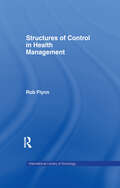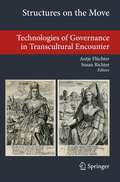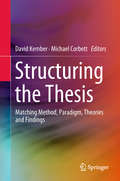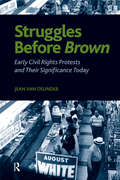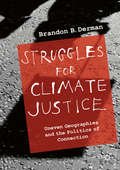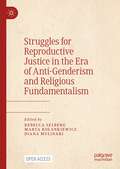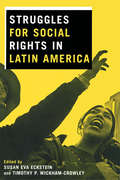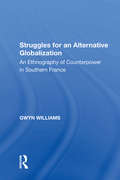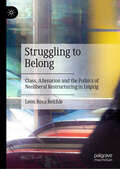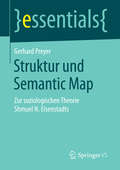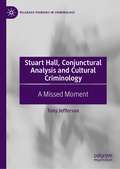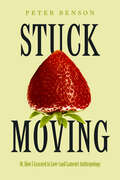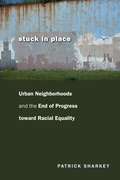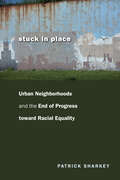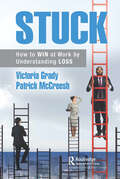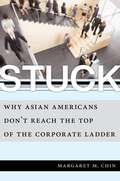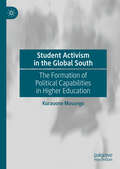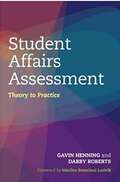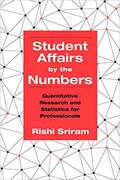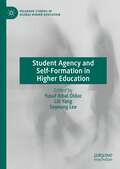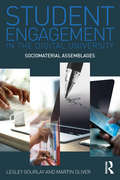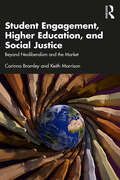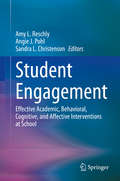- Table View
- List View
Structures of Control in Health Management (International Library of Sociology)
by Rob FlynnUsing a variety of evidence the author documents the rise of general management, the application of new techniques to reduce medical costs and improve efficiency, and other methods to control use and evaluate clinical performance.
Structures on the Move
by Antje Flüchter Susan RichterThis book enters new territory by moving toward a new conceptual framework for comparative and interdisciplinary research on transcultural state formation. Once more, statehood and governance are highly discussed topics, whereby modern state building is often considered to be a genuinely European characteristic, despite the fact that early modern Europeans knew of, experienced and grappled with highly developed states in Asia. The articles collected in this book discuss how strategies of governance were part of transcultural transfers between the two continents. The first part presents and discusses concepts of statehood in order to provide a set of conceptual tools for analyzing the transcultural appropriation of governmental strategies. The second part is concerned with case studies that examine the transcultural perception of governance, and the third and final part gathers perspectives on political practice in transcultural encounters (e.g. military, administration, and diplomacy)
Structuring the Thesis: Matching Method, Paradigm, Theories and Findings
by Michael Corbett David KemberThe book is a collective investigation of the structuring of theses in education, the social sciences and other disciplines that commonly do not follow the standard procedures of the scientific method. To help research students design a structure for their own thesis and liberate their investigations from the constraints associated with the use of the conventional structure, it explains how the structures adopted were designed to suit the topic, methodology and paradigm. It also provides a wide range of examples to draw upon, which suit a broad spectrum of theory, methodological approaches, research methods and paradigms. Additionally, by analyzing the methodologies and paradigms, and reviewing the methodological and paradigmatic spectrum, it offers a significant contribution to the way research is conceptualized.The book addresses a number of key questions faced by students, supervisors and examiners: •Why do examiners often find it difficult to read work in non-scientific disciplines when theses are structured in accordance with the conventional scientific method?•Why do students in non-scientific disciplines struggle to write up the outcomes of their research in the conventional structure?•What alternative thesis structures can be devised to better suit the wide range of methods?•Which theories and paradigms are commonly followed in education and the social sciences and how do these perspectives influence the research process? •What methods, theories and paradigms are commonly adopted by education and social science students and what problems do these pose when students write their theses?
Struggles Before Brown: Early Civil Rights Protests and Their Significance Today
by Jean Van DelinderThere were many little-known challenges to racial segregation before the landmark Supreme Court decision in Brown v. Board of Education (1954). The author's oral history interviews highlight civil rights protests seldom considered significant, but that help us understand the beginnings of the civil rights struggle before it became a mass movement. She brings to light many important but largely forgotten events, such as the often overlooked 1950s Oklahoma sit-in protests that provided a model for the better-known Greensboro, North Carolina, sit-ins. This book's significance lies in its challenge to perspectives that dominate scholarship on the civil rights movement. The broader concepts illustrated-including agency, culture, social structure, and situations-throughout this book open up substantially more of the complexity of the civil rights struggle. This book employs a methodology for analyzing not just the civil rights movement but other social movements and, indeed, social change in general.
Struggles for Climate Justice: Uneven Geographies and the Politics of Connection
by Brandon Barclay DermanThis book provides an accessible but intellectually rigorous introduction to the global social movement for ‘climate justice’ and addresses the socially uneven consequences of anthropogenic climate change.Deploying relational understandings of nature-society, space, and power, Brandon Derman shows that climate change has been co-produced with social inequality. Mismatching levels of responsibility and vulnerability, and institutions that emerged in tandem with those disproportionalities compose the terrain on which NGOs and social movements now contest climate injustice in a wide-ranging “politics of connection.” Case-based chapters explore the defining commitments of affected and allied communities, and how they have shaped specific struggles mobilizing human rights, international treaties, transnational activist forums, national and local constituencies, and broad-based demonstrations. Derman synthesizes these cases and similar efforts across the globe to identify and explore crosscutting themes in climate justice politics as well as the opportunities and dilemmas facing advocates and activists, and those who would ally with them going forward. How should we understand campaigns for climate justice? What do these initiatives share, and what differentiates them? What, in fact, does “climate justice” mean in these contexts? And what do the framing and progression of such efforts in different settings suggest about the broader conditions that produce and sustain climate injustice, how those conditions could be unmade, and what might take their place? Struggles for Climate Justice approaches these questions from an interdisciplinary perspective accessible to graduate and advanced undergraduate students as well as scholars of geography, social movements, environmental politics, policy, and socio-legal studies.
Struggles for Reproductive Justice in the Era of Anti-Genderism and Religious Fundamentalism
by Diana Mulinari Marta Kolankiewicz Rebecca SelbergThis open access book engages with the concept of reproductive justice by exploring case studies of struggles around abortion in the context of rising anti-genderism, religious fundamentalism, and ethno-nationalism. Based on rich qualitative data offering in-depth analyses from different geographical, political and cultural contexts, the book explores how reproductive justice is understood, contested and given meaning. Chapters further develop the Black feminist concept of reproductive justice in a critical dialogue with postcolonial theory and explore the strength of transnational feminist practices. This book thus offers a fresh approach to the issue of abortion by engaging with contemporary political and cultural processes, and it expands the narrow notions of women’s rights, particularly notions of property rights over bodies, towards an analysis of the political economy of social reproduction and how it affects bodies that can be pregnant. This volume will be of interest to scholars with interests in reproductive justice, anti-gender politics, and religious fundamentalism.
Struggles for Social Rights in Latin America
by Susan Eva Eckstein Timothy P. Wickham-CrowleyThis is a collection of original essays focusing on social rights in Latin America, covering four areas in particular: subsistence, labor, gender, and race/ethnicity within the original framework of human rights. Topics covered include the environment, AIDS, workers' rights, tourism, and many more.
Struggles for an Alternative Globalization: An Ethnography of Counterpower in Southern France
by Gwyn WilliamsThrough an anthropological study of a highly influential movement of French 'alterglobalization' activists, this book offers an ethnographic window onto the global movement against corporate capitalism and the neoliberal policies of the WTO. Based on extensive fieldwork on the Larzac plateau in rural southern France, it explores the politics of protest in which activists engage. It examines their resistance to various forms of power, their organization of struggle, their attempts to live out their ideals in daily life, and their challenges to conventional understandings of politics, democracy, economics, morality and globalization. By subjecting power and resistance to ethnographic study rather than adopting them as abstract categories of analysis, this volume makes an important contribution to theoretical debates on globalization, domination and resistance. It will be of interest not only to anthropologists and scholars of social movements, but also to sociologists and political scientists, as well as to activists themselves.
Struggling to Belong: Class, Alienation and The Politics of Neoliberal Restructuring in Leipzig
by Leon Rosa ReichleThis book offers an invaluable study on class composition in Leipzig, the city renowned for its pivotal role in the downfall of state socialism. It describes how class changes with the city&’s neoliberal restructuring, that has at its core the commodification and financialization of the spaces people inhabit. Through an ethnographic lens it illustrates how the city's transformation alienates its inhabitants and generates fragmentations between them, hindering their collective appropriation of their city, neighbourhoods and homes. Their different experiences of uneven development divide them despite similar concerns of rising rents. Interplaying with the local history of shrinkage, deindustrialization and austerity, the overall alienation feeds into collective lethargic depressive moods that permeates also institutions of the local administration, leaving them reluctant to intervene with the confident actions of investors and growth-oriented politicians. A few exceptionally stubborn small urban movements generate islands in this sea of decomposition, they do however not suffice to halt the fast pace of restructuring. The book contributes to political urban class analyses by combining the study of subjectivation in uneven development with an affect-sensitive scrutiny of tenant power and its limits vis-à-vis a financializing housing market and an austerity ridden local state.
Struktur und Semantic Map: Zur soziologischen Theorie Shmuel N. Eisenstadts (essentials)
by Gerhard PreyerGerhard Preyer rekonstruiert in diesem essential den harten Kern von Shmuel N. Eisenstadts allgemeiner Soziologie, wie Eisenstadt sie in der Untersuchung der Beziehung zwischen Handeln (Kreativit#65533;t) und Struktur sowie zwischen Kultur und Sozialstruktur durchgef#65533;hrt hat. Preyer ordnet seine Untersuchung in dem von ihm sogenannten ,,semantischen Map" als eine evolution#65533;re Universalie des ,,konstitutiven basalen Bezugsrahmens" der Erforschung der sozio-strukturellen Evolution an. Aus Eisenstadts Sicht legen die grundlegenden semantischen Maps das zentrale Problem der menschlichen und der sozialen Existenz, die Spezifikation ihrer L#65533;sungen und die Beziehung zu den grundlegenden Annahmen #65533;ber die soziale Ordnung fest. Das Semantic Map und der Kampf um die Verteilung von Ressourcen ist der forschungsprogrammatische Bezugsrahmen seiner Reformulierung der Modernisierungstheorie, der Kritik an der klassischen Modernisierungstheorie als einer Konvergenztheorie und seiner Fassung des Problems der sozialen Ordnung. Die Studie wird mit einer Modifikation von Eisenstadts Ansatz einer mitgliedschaftstheoretischen Reinterpretation abgeschlossen.
Strukturanalyse der Gegenwart (René König Schriften. Ausgabe letzter Hand #12)
by René KönigStrukturfragen und Funktionsprobleme der modernen Gesellschaft sind für René König ein Leitthema, das in den unterschiedlichsten Zusammenhängen immer wieder auftaucht, wenn er sich konkreten inhaltlichen Problemfeldern der Gesellschaft in einer soziologischen Gegenwartsanalyse zuwendet Dabei hat König keine systematische Strukturanalyse der Gesellschaft betrieben, auch hat er die Gesellschaft nicht einer abstrakten strukturell-funktionalen Betrachtung unterzogen. In systematischen Beiträgen oder gelegentlich auch beiläufigen Aufsätzen zu den Themen Massengesellschaft und Zeitbewusstsein, Konsum und Ernährung, Alter, Jugend und Geschlecht, entfaltet sich vor allem im Zusammenhang von Industrialisierung und Technikentwicklung sowie unter dem übergeordneten Fokus des sozialen Wandels eine prägnante, konsistente und kontinuierliche Analyse gesellschaftlicher Strukturzusammenhänge, mit denen König "soziologische Orientierung" in der Gegenwartsgesellschaft vermitteln wollte. Zusätzlich enthält der Band Königs Beiträge zur Sozialpsychologie und Psychoanalyse.
Stuart Hall, Conjunctural Analysis and Cultural Criminology: A Missed Moment (Palgrave Pioneers in Criminology)
by Tony JeffersonThis book discusses Stuart Hall's unique contribution to criminology. It suggests that this is captured best in Hall’s commitment to understanding a given historical moment, or conjuncture, in its full complexity, and his continuous deployment of an appropriate methodology, conjunctural analysis, to do so. This provides a running thread linking Hall’s early work on youth subcultures, the media, the state and hegemony to his later work on racial identities, racism and the politics of difference. This is contrasted with more theoretically-driven work in cultural criminology. Its failure to adopt a conjunctural approach constitutes, for the author, something of a missed moment. To demonstrate the continuing relevance of this form of analysis, the book provides a conjunctural analysis of Brexit, including its psychosocial dimension and concludes with a brief analysis of Trump’s failure to get re-elected. The book is intended for students of criminology and cultural studies.
Stuck Moving: Or, How I Learned to Love (and Lament) Anthropology (Atelier: Ethnographic Inquiry in the Twenty-First Century #9)
by Peter BensonThis one-of-a-kind literary and conceptual experiment does anthropology differently—in all the wrong ways. No field trips. No other cultures. This is a personal journey within anthropology itself, and a kind of love story. A critical, candid, hilarious take on the culture of academia and, ultimately, contemporary society. Stuck Moving follows a professor affected by bipolar disorder, drug addiction, and a stalled career who searches for meaning and purpose within a sanctimonious discipline and a society in shambles. It takes aim at the ableist conceit that anthropologists are outside observers studying a messy world. The lens of analysis is reversed to expose the backstage of academic work and life, and the unbecoming self behind scholarship. Blending cultural studies, psychoanalysis, comedy, screenwriting, music lyrics, and poetry, Stuck Moving abandons anthropology’s rigid genre conventions, suffocating solemnity, and enduring colonial model of extractive knowledge production. By satirizing the discipline’s function as a culture resource for global health and the neoliberal university, this book unsettles anthropology’s hopeful claims about its own role in social change.
Stuck in Place: Urban Neighborhoods and the End of Progress Toward Racial Equality
by Patrick SharkeyIn the 1960s, many believed that the civil rights movement's successes would foster a new era of racial equality in America. Four decades later, the degree of racial inequality has barely changed. To understand what went wrong, Patrick Sharkey argues that we have to understand what has happened to African American communities over the last several decades. In Stuck in Place, Sharkey describes how political decisions and social policies have led to severe disinvestment from black neighborhoods, persistent segregation, declining economic opportunities, and a growing link between African American communities and the criminal justice system. As a result, neighborhood inequality that existed in the 1970s has been passed down to the current generation of African Americans. Some of the most persistent forms of racial inequality, such as gaps in income and test scores, can only be explained by considering the neighborhoods in which black and white families have lived over multiple generations. This multigenerational nature of neighborhood inequality also means that a new kind of urban policy is necessary for our nation's cities. Sharkey argues for urban policies that have the potential to create transformative and sustained changes in urban communities and the families that live within them, and he outlines a durable urban policy agenda to move in that direction.
Stuck in Place: Urban Neighborhoods and the End of Progress toward Racial Equality
by Patrick SharkeyIn the 1960s, many believed that the civil rights movement’s successes would foster a new era of racial equality in America. Four decades later, the degree of racial inequality has barely changed. To understand what went wrong, Patrick Sharkey argues that we have to understand what has happened to African American communities over the last several decades. In Stuck in Place, Sharkey describes how political decisions and social policies have led to severe disinvestment from black neighborhoods, persistent segregation, declining economic opportunities, and a growing link between African American communities and the criminal justice system. As a result, neighborhood inequality that existed in the 1970s has been passed down to the current generation of African Americans. Some of the most persistent forms of racial inequality, such as gaps in income and test scores, can only be explained by considering the neighborhoods in which black and white families have lived over multiple generations. This multigenerational nature of neighborhood inequality also means that a new kind of urban policy is necessary for our nation’s cities. Sharkey argues for urban policies that have the potential to create transformative and sustained changes in urban communities and the families that live within them, and he outlines a durable urban policy agenda to move in that direction.
Stuck: How to WIN at Work by Understanding LOSS
by Victoria Grady Patrick McCreeshOur work life is changing. Every day new companies, technologies, and ideas emerge that impact how, where, and most importantly, why we work. Despite this exciting evolution, people remain the heart of change. People are tricky. People don’t seem to evolve as fast as global trends. People get Stuck. Teams have people moving at different speeds with different levels of adoption in our evolving workplace. Some evolve and some don’t. Teams get Stuck. Leaders, managers, and teammates struggle with this resistance and get frustrated. Frustrated people impact the performance of every organization. Organizations get Stuck. Why? The answer is deeply human and biological, rooted in the way our brain interacts with everything in the world, even work. When people feel they are losing something, they react by getting Stuck. Stuck connects over 20 years of research on our brain’s reaction to the evolving workplace with real stories of people journeying through the challenge of being Stuck. The organizations, leaders, and managers who understand these concepts will evolve with the future. Those organizations will understand LOSS as a tool to achieve business WINs. This book addresses a critical concept that closes a gap in other popular business publications. Many books tell leaders and managers the process of how to change their organizations. However, many of these books lack a key mechanism for understanding human interactions. The mechanism is a biological function developed through evolution called attachment – the human need to connect to different tangible and intangible objects for support. Attachment is the reason that people connect with leaders and corporate culture, but also what creates a deep sense of loss during even the smallest changes. Stuck offers a complete understanding of attachment and how it impacts individuals, relationships, and organizations. The root of the challenge is the human need to connect to different tangible and intangible objects for support. The basis of the need for support is grounded in our need for attachment. Those who learn to understand loss through attachment behavior and the attachments of others will succeed. In addition, this book provides original data-based evidence from assessments conducted with nearly 20,000 respondents and original stories from the application of attachment concepts in more than 150 organizations across all sectors around the globe. It shines a light on attachment and use it as a lens to better understand our workplace. Stuck is not an academic study. It is a practical guide for leading the brain through change. For the first time, the authors tell stories that demonstrate their research and offer a roadmap for how to leverage attachment research to drive business success. Stuck provides not only the deep lessons from the authors’ research, but clear steps for readers to use the lessons of attachment in their own work. In this way, the book serves as a guide to those leaders, managers, and employees who are ready to be unStuck.
Stuck: Why Asian Americans Don't Reach the Top of the Corporate Ladder
by Margaret M. ChinWinner, 2022 Max Weber Award for Distinguished Scholarship, given by the American Sociological Association's Section on Organizations, Occupations, and WorkWinner, 2021 PROSE Award in the Business, Finance & Management CategoryA behind-the-scenes examination of Asian Americans in the workplaceIn the classroom, Asian Americans, often singled out as so-called “model minorities,” are expected to be top of the class. Often they are, getting straight As and gaining admission to elite colleges and universities. But the corporate world is a different story. As Margaret M. Chin reveals in this important new book, many Asian Americans get stuck on the corporate ladder, never reaching the top.In Stuck, Chin shows that there is a “bamboo ceiling” in the workplace, describing a corporate world where racial and ethnic inequalities prevent upward mobility. Drawing on interviews with second-generation Asian Americans, she examines why they fail to advance as fast or as high as their colleagues, showing how they lose out on leadership positions, executive roles, and entry to the coveted boardroom suite over the course of their careers. An unfair lack of trust from their coworkers, absence of role models, sponsors and mentors, and for women, sexual harassment and prejudice especially born at the intersection of race and gender are only a few of the factors that hold Asian American professionals back.Ultimately, Chin sheds light on the experiences of Asian Americans in the workplace, providing insight into and a framework of who is and isn’t granted access into the upper echelons of American society, and why.
Student Activism in Asia: Between Protest and Powerlessness
by Stephan Ortmann Patricio N. AbinalesSince World War II, students in East and Southeast Asia have led protest movements that toppled authoritarian regimes in countries such as Indonesia, South Korea, and Thailand. Elsewhere in the region, student protests have shaken regimes until they were brutally suppressed—most famously in China&’s Tiananmen Square and in Burma. But despite their significance, these movements have received only a fraction of the notice that has been given to American and European student protests of the 1960s and 1970s. The first book in decades to redress this neglect, Student Activism in Asia tells the story of student protest movements across Asia.Taking an interdisciplinary, comparative approach, the contributors examine ten countries, focusing on those where student protests have been particularly fierce and consequential: China, Japan, Hong Kong, Taiwan, South Korea, Indonesia, Burma, Malaysia, Thailand, and the Philippines. They explore similarities and differences among student movements in these countries, paying special attention to the influence of four factors: higher education systems, students&’ collective identities, students&’ relationships with ruling regimes, and transnational flows of activist ideas and inspirations.The authors include leading specialists on student activism in each of the countries investigated. Together, these experts provide a rich picture of an important tradition of political protest that has ebbed and flowed but has left indelible marks on Asia&’s sociopolitical landscape.Contributors: Patricio N. Abinales, U of Hawaii, Manoa; Prajak Kongkirati, Thammasat U, Thailand; Win Min, Vahu Development Institute; Stephan Ortmann, City U of Hong Kong; Mi Park, Dalhousie U, Canada; Patricia G. Steinhoff, U of Hawaii, Manoa; Mark R. Thompson, City U of Hong Kong; Teresa Wright, California State U, Long Beach.
Student Activism in the Global South: The Formation of Political Capabilities in Higher Education
by Kurauone MasungoThis book makes an original conceptual and empirical contribution to debates on the role of student activism in enhancing social justice within education in the Global South, using South Africa as a case study. The book explores the development of higher education students’ political capabilities through student activism – that is, the freedom to express political ideas and engage in protests, including the following key capabilities: participation, dialogue, practical reasoning, voice, emotional expression, contextual knowledge and physical wellbeing. The author considers the possibility of enhancing justice and democracy in higher education through the formation of such student freedoms. The book will be of interest to academics and researchers in student activism, higher education and social justice, as well as institutional staff members with knowledge of student governance, members of student representative councils and higher education administrators.
Student Affairs Assessment: Theory To Practice
by Gavin W. Henning Darby Roberts Marilee Bresciani LudvikWith the recognition of the integral role of student affairs in student education, and with stakeholders requiring increasing accountability at a time of tight resources, it has become imperative that staff be familiar with and competent in undertaking assessment. This book provides student affairs staff with the grounding they need to integrate assessment into how they design and monitor the programs, services, and activities they create to contribute to students’ development. This book is intended both as a text for student affairs and higher education master’s programs, and as a practical guide for early career staff who have had little formal preparation in assessment. It can be used for self-study or in professional development workshops. For divisions, departments, or units getting started with assessment, the discussion questions at the end of the chapters can engage staff in the process of developing an effective assessment culture. This book provides a thorough introduction to all aspects of assessment, assuming no prior knowledge, and illustrated throughout with examples of application in student affairs settings. Key elements include: •Takes into account the latest standards and competencies defined by AAC&U, ACPA, AER, CAS, NASPA, and others •Introductory and comprehensive •Provides essential background and theory •Covers preparation, planning and design •Describes the full range of assessment methods •Introduces principles and methods of qualitative and quantitative analysis •Guidance on using and sharing results •Addresses cultivating and sustaining a culture of assessment •Considers ethical and political concerns •Covers use of technology •Illustrated throughout by examples of practice in student affairs.
Student Affairs by the Numbers: Quantitative Research and Statistics for Professionals
by Rishi SriramStudent Affairs by the Numbers aims to be the go-to book for student affairs professionals who want to know the basics of quantitative research and statistics for their work. Books on assessment in student affairs tend to discuss processes more than research design and statistics. Most books on statistics share too much information for practitioners, overwhelming them and making it difficult to discern what they need to know. Since these books do not use examples from student affairs, it is even more difficult for practitioners to connect with new concepts. <p><p> Student Affairs professionals need to know how to design a study, collect data, analyze data, interpret results, and present the results in an understandable manner. This book will begin by establishing the need for these skills in student affairs and then quickly move to how to develop a research culture, how to conduct research, how to understand statistics, and concluding with how to change our research/assessment behaviors in order to make higher education better for students.
Student Agency and Self-Formation in Higher Education (Palgrave Studies in Global Higher Education)
by Lili Yang Soyoung Lee Yusuf Ikbal OldacThis edited volume argues for positioning students at the centre of higher education, drawing from the concepts of student agency and self-formation. The volume highlights that higher education has broader and more important purposes than what a neoliberal human capital approach would suggest, and explores how students exercise their agency and realise self-formation as inherently connected concepts throughout university education. With disciplinary, cultural, and contextual diversity, this volume will provide international perspectives to readers interested in higher education theories, policies, and practices.
Student Engagement in the Digital University: Sociomaterial Assemblages
by Martin Oliver Lesley GourlayStudent Engagement in the Digital University challenges mainstream conceptions and assumptions about students’ engagement with digital resources in Higher Education. While engagement in online learning environments is often reduced to sets of transferable skills or typological categories, the authors propose that these experiences must be understood as embodied, socially situated, and taking place in complex networks of human and nonhuman actors. Using empirical data from a JISC-funded project on digital literacies, this book performs a sociomaterial analysis of student–technology interactions, complicating the optimistic and utopian narratives surrounding technology and education today and positing far-reaching implications for research, policy and practice.
Student Engagement, Higher Education, and Social Justice: Beyond Neoliberalism and the Market
by Keith Morrison Corinna BramleyStudent engagement is a catch-all term, irresistible to educators and policy makers, and serving many agendas and purposes. This ground-breaking book provides a powerful theory of student engagement, rooted in critical theory and social justice. It sets out a compelling argument for student engagement to promote social justice and to repel neoliberalism in, and through, higher education, addressing three key questions: Student engagement in what? Student engagement for what? Student engagement for whom? The answers draw on Habermas, Honneth, Gramsci, Foucault, and Giroux in examining ideology, power, recognition, resistance, and student engagement, with examples drawn from across the world. It sets out key features, limitations, and failures of neoliberalism in higher education, and indicates how student engagement can resist it. Student engagement calls for higher education institutions to be sites for challenge, debate on values and power, action for social justice, and for students to engage in the struggle to resist neoliberalism, taking action to promote social justice, democracy, and the public good. This book is essential reading for educators, researchers, managers and students in higher education, social scientists, and social theorists. It is a call to reawaken higher education for social justice, human rights, democracy, and freedoms.
Student Engagement: Effective Academic, Behavioral, Cognitive, and Affective Interventions at School
by Amy L. Reschly Sandra L. Christenson Angie J. PohlThis book provides cutting-edge, evidence-based strategies and interventions that target students’ engagement at school and with learning. Coverage begins with the background and 29-year history of the Check & Connect Model and describes the model and assessment of student engagement that served as the backdrop for conceptualizing the engagement interventions described in the book. Subsequent chapters are organized around the subtypes of student engagement – academic, behavioral, affective, cognitive – that were developed based on work with the Check & Connect Model. Principles and formal interventions are presented at both the universal and more intensive levels, consistent with the Response-to-Intervention/Multi-Tiered System of Support (MTSS) framework. The book concludes with a summary on the lessons learned from Check & Connect and the importance of a system that is oriented toward enhancing engagement and school completion for all students. Interventions featured in this book include: Peer-Assisted Learning Strategies (PALS).The Homework, Organization, and Planning Skills (HOPS) Intervention.The Good Behavior Game in the classroom.Check-in, Check-out (CICO). Banking Time, a dyadic intervention to improve teacher-student relationshipsThe Self-Regulation Empowerment Program (SREP). Student Engagement is a must-have resource for researchers, professionals, and graduate students in child and school psychology, educational policy and politics, and family studies.
